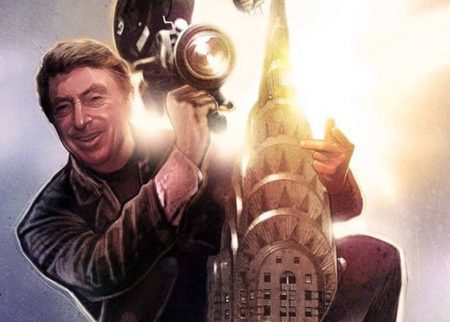
Larry Cohen is without question one of the most influential filmmakers of our generation. His name is held in the highest regard much like other masters of horror like Dario Argento, John Carpenter, and the late (R.I.P.) George A. Romero. Much like Romero, he’s a maverick of independent cinema, and his tales of guerilla shooting have become legendary. Many of these stories as well as the highlights of his career are being celebrated in director Steve Mitchell’s documentary KING COHEN which made a triumphant premiere at the Fantasia International Film Festival in Montreal two weeks ago. I talked with Larry just a few days before he made the trip there where he was to receive the Lifetime Achievement Award. Though at the time, he (jokingly) wasn’t so sure it was real.
Corey Danna: Next week you have the world premiere of the documentary KING COHEN at the Fantasia Film Festival. You’re also being awarded the Lifetime Achievement Award, how do you feel about that?
Larry Cohen: That’s what I heard. I’ll find out when I get there. This could be a trick to get me up to Canada.
CD: They might get you up there and not let you come back.
LC: That’s right! Trump can get me up there and steal my passport, he can pull any trick he wants. They have phony awards and stuff, that’s part of his tactics to get you out of the country. I’m suspicious of the whole thing. I haven’t seen the documentary yet so when I get there I’ll get to see what everyone has to say.
CD: Can you tell me a bit about meeting Steve Mitchell and how it led to KING COHEN?
LC: I didn’t know Steve, he called me up and said he and his partners were going to make a documentary about me and asked if I would cooperate. I agreed but I didn’t want any control over the picture. I’ve written, directed, and produced over twenty movies and I’m a bit of a control freak. I want to be in control of everything, every facet of the motion picture. I knew if I was overly involved in the documentary I’d be telling them what to do and taking over the whole project. That wasn’t something I wanted to do so I told them to just go ahead and make the picture, I wouldn’t even look at it until it was completed.
CD: Are you aware of the scope of talent he was able to wrangle to talk about you and your films?
LC: I’ve seen the list of people, everyone from J.J. Abrams and Martin Scorsese to Rick Baker and lots of other people. I’m sorry he couldn’t reach Quentin Tarantino or Spielberg, I’m sure they would have participated too. I didn’t get involved so I didn’t call anyone to ask them to be in it.
CD: All your films are more than just horror, action, or sci-fi films, they have these underlying social commentaries and deeper messages. Are your stories born from the messages you want to get across or vice versa?
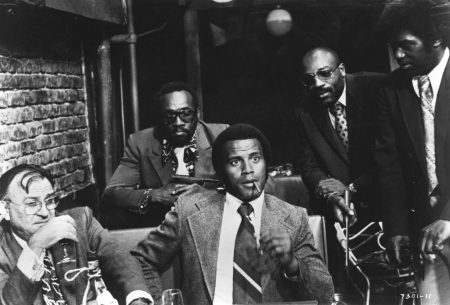
LC: I started out writing for television and doing some really political dramas. I always try to put some sort of message into my work, even the television series I created like BRANDED, about a black-listed cowboy. It was a parallel to the black-listing that was happening in America at the time. They would never put a show on the air which would blatantly address these issues so I disguised it as a western. I did the INVADERS which was about aliens hiding out and at the same time, there were all these communist witch hunts going on so I tried to parallel that with the series. I’ve always tried to put social commentary into my work.
CD: BLACK CAESAR and HELL UP IN HARLEM are two of my personal favorite films of yours. Even though HELL was a sequel to BLACK CAESAR, it’s a much different film. It’s far more action oriented, where the original film is more of a crime drama. Tell me a bit about why these films are so distinctly different in tone?
LC: Even though it was a sequel, I didn’t want to make the same movie twice. Frankly, they ordered the sequel right after BLACK CAESER opened and was a huge hit. I didn’t have much time to write a script so we just started shooting the movie without one. We made it up as we went along, I would find a great location and just say, “Hey, I want to have a chase here!” The locations I discovered basically determined the direction of the story. The first film had a very carefully crafted script but the second one was made on the run. I was shooting IT’S ALIVE for Warner Bros. during the week and shoot HELL on weekends with most of the same crew. We were pretty exhausted but we made two pictures simultaneously and edited two pictures simultaneously. I’ve done pictures back to back but this was the only time I did two simultaneously, I don’t know too many people who have done that. That poor editor, he actually went on to edit some of the HARRY POTTER movies, he was so confused at times. Half the time he didn’t even know what he was editing.
CD: As a writer, you’ve placed your work in the hands of some pretty interesting talent. Who do you feel has done the best job bringing your work to the screen and what were some of the films you were disappointed in?
LC: All of them! I can’t tell you I was 100% satisfied with the pictures made from any of my scripts. Thinking back, I was excited at the prospect working with some of these directors like Mark Robson who directed THE HARDER THEY FALL with Humphrey Bogart. He made some really great movies and I was excited to see what he was going to come up with but apparently that was all in the past. He was soft, quiet, and lazy. He did a horrible job casting the picture, it was called DADDY’S GONE A-HUNTING. After that, I had the urge to direct my own movies. It was a fabulous script and he really made a mess of it so I knew I had to make my own movies. He actually did me a favor. I worked with Sydney Lumet, he was one of my idols and I thought it was going to be one of the best experiences of my life. Unfortunately, Sydney was more interested in watching the World Series than doing the picture. The film was called GUILTY AS SIN but Rebecca De Mornay who starred in it, refers to the movie as GUILTY AS SYDNEY so he really disappointed me too. If Sydney Lumet can’t satisfy you, then I don’t know who can. It turned out to be the most successful film Sydney Lumet directed in 20 years. It made a lot of money and was number one at the video stores for a few months. It did really well for Disney and I got about a million dollars worth of jobs as a result of it but I was still severely disappointed in it, so carelessly put together.
CD: Michael Moriarty was essentially your “go to” guy for many years. Can you talk a bit about how you met and your relationship with him?
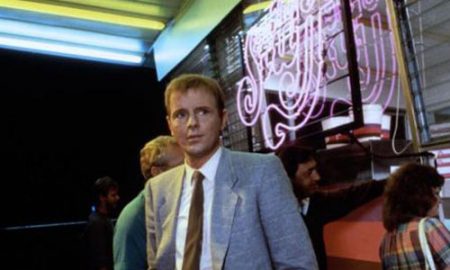
LC: We had so much fun working together on that first film Q: THE WINGED SERPENT, I wanted to get him back on some stuff as soon as possible. The films wouldn’t have turned out the way they did if he hadn’t brought so much to the characters. All of the interesting characteristics came out in the first few days of filming. In Q, we changed the character to a piano player, in THE STUFF we changed the character into a southerner, once Moriarty got into the picture, everything would just change for the better. I think he is one of the greatest actors in film! He’s been very well honored, he’s won the Golden Globe multiple times, an Emmy multiple times, and a Tony Award for his work on Broadway once. He’s won everything but an Oscar so I couldn’t have found a better actor. I was just taken by him and we wound up doing five pictures together.
CD: One of my earliest memories of watching a film was seeing IT’S ALIVE with my dad. Can you talk a bit about the legacy of these pictures?
LC: Some horror films just become classics and they live on! Most movies that are 50 years old are long forgotten but IT’S ALIVE keeps surfacing all the time. I’m so very pleased with that. Rick Baker and I worked to design the creature but he sculpted it and made it come to life. He did such a fabulous job! Today, the picture has been imitated numerous times but it’s still a wonderful film, mainly because of the performance of John P. Ryan. In my movies, the characters and actors are more important than the monster.
CD: That’s very apparent in your films but it’s not always the case with most horror films.
LC: Oh no, I grew up watching horror films and the characters were so cardboard, they were so stupid. There were always these nuclear physicists played by these blonde girls with big boobs, yeah, I believe that! Not to denigrate anybody, but it was always so absurd. They would never actually cast someone who could pass as a brilliant scientist, they would rather cast a centerfold model. None of the characters had any depth and I’m not talking about the classic Universal Monsters. Slasher movies too, I can’t stand slasher movies, those are just a bunch of teenagers being slaughtered so I have no interest in them.
CD: As an independent filmmaker, you had to do some “questionable” things in order to get a shot. What were some of the more outlandish things and if you had the chance to do it again, would you have done them differently?
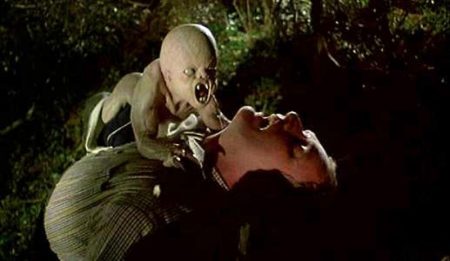
LC: If I had a second chance, I probably would have never done them at all. Today, I never would have taken someone up to the top of the Chrysler Building almost 80 stories up with the building swaying in the wind. There was just a little narrow ladder up to the pinnacle of the building and they were firing machine guns off. I caused enough trouble back then when everyone thought we were terrorists firing at the United Nations Building. There were headlines in the newspaper that read, “Hollywood production terrorizes New York”. Today, I just wouldn’t have done it because of the security and the obsession with terrorism. We certainly wouldn’t have been running around Times Square in BLACK CAESAR with guns in our hands. In HARLEM, we had Fred Williamson perched up on top of the Sony sign there with a telescopic rifle. I was there with him but today we would have been picked off by the helicopter patrol. Luckily, we got out alive! When we shot the big fight in the airport, which we didn’t have permission to do, we just went out and staged the fight on the baggage conveyor. They then ran up the ramp onto the airfield and ran across it. Today, we would get at least five years in prison for that. I look back and say, “I did it! But I sure as hell wouldn’t do it again!” That’s why I think it’s all a trick to get me up to Canada so they can arrest me!
CD: The landscape of filmmaking has changed so much since you started, the way they are shot, distributed, etc. Some is for the better, some is for the worse, can you talk a bit about being witness to these changes and what you feel to be positive or negative?
LC: I think it’s all for the worse. Years ago you could make a film, a low budget picture, and you actually had a chance to get theatrical distribution. Today, except for a few horror films, smaller pictures hardly get any distribution. Now, your picture will go straight to Netflix, Amazon, or some other cable. You really lose out on not being able to see a movie with an audience. That’s part of why it will be so enjoyable to be up in Montreal. They’re running four of my movies up there for audiences and I’ll be able to go in there and see their reactions. I love the thrill of seeing my films with an audience. I’ve done it many times and it’s always exciting but now this has changed. Everything is sold first to DVD then later on to cable, there’s no more theatrical. This was one of the main reasons I quit making pictures.
CD: Companies like Blue Underground and Arrow have put together some amazing special editions for some of your films. Are there any plans to release anymore?
LC: I don’t know but I hope there is! I don’t deal directly with any of them but I really appreciate the work they’ve done. Especially the special edition they put together for my film BONE, the transfer is absolutely gorgeous! They included some rare 16mm footage I shot when I first tried making the film with a slightly different cast. There’s even an easter egg in there you can discover that shows my acting job for a TV pilot.
CD: In all of your career, what’s been the most important or meaningful moment you’ve experienced?
LC: That’s a tough question since there have been so many over the years. I’ve gotten a kick out of every picture I’ve ever done, the successful ones and the un-successful ones. Sometimes with the ones that weren’t so successful, you would have a relationship with someone that was so pleasant and meaningful, the picture will have a warm spot in your heart even though it was a failure.
CD: Several of your films have been remade over the years, what are your thoughts on the whole remake craze happening in Hollywood?
LC: I’ve seldom seen a remake which was better than the original. They spend a lot of money, they have good people doing them, look at THE MANCHURIAN CANDIDATE. The remake had Denzel Washington and Meryl Streep but the original with Frank Sinatra was way better. Just throwing big names and a lot of money on something doesn’t equal success. There are so many sequels and remakes being made that there’s a huge lack of originality. If you went into a studio with an original idea, they’d look at you blankly and ask you what it’s like. When you tell them it’s not like anything else, it’s completely different, they would send you on your way because if they haven’t seen it before, they probably wouldn’t like it. That’s the way they are, the executives today are so devoid of any imagination or talent. All they want to do is play it safe and do a sequel or remake. It’s poor creative judgment and the studios just hire these truly incompetent people, they don’t belong there in the first place.
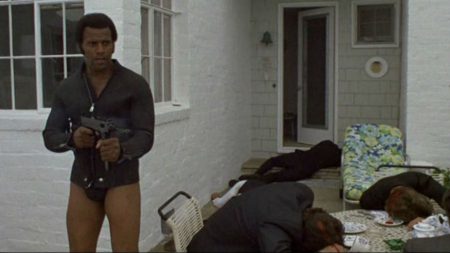
CD: To the fans all over the world who have supported you and your pictures all these years, what would you like to say to them?
LC: I would like to say thank you very much, keep on watching them! The only way people hear about these films anymore is by word of mouth so please tell your friends about them. It would be impossible to keep advertising them and most of the companies who released them are no longer around. Most of the films and companies have been absolved to larger ones like MGM. They have a library of thousands of films and very little time to pay any attention to what they have got. Some of them are available on DVD while others are DVD ON DEMAND where you have to request the picture from the studio and they make copies for you and send them out. Most my films are available on Amazon or Netflix, just search my name and have a Larry Cohen party! With the Blu-Rays coming out, I do audio commentary and I actually talk about the films from beginning to the end. I never stop talking! Many people have complimented my commentaries because they can tell I really enjoy doing them. I’m really happy my films and series keep re-emerging. Most of them are long into profits so they keep sending me checks and I’m always excited to cash them. I don’t know what it is about me but when I get a check I have an urge to cash it. Some people just tell me to save them but they’re pretty sizable so I rush to the bank immediately before they change their mind. Are you up in Montreal?
CD: No, I wish I was.
LC: Well where are you then?
CD: I’m in Michigan.
LC: I’m not coming there unless they have a film festival or something. Maybe you should start one.
CD: It’s something I’ve been looking into.
LC: You should do it!
CD: Thanks Larry for spending some time on the phone with me.
LC: Thank you for all the support!
For more information about KING COHEN, visit the official website!
 Horror News | HNN Official Site | Horror Movies,Trailers, Reviews
Horror News | HNN Official Site | Horror Movies,Trailers, Reviews
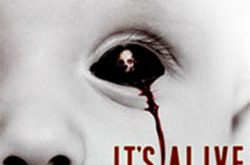
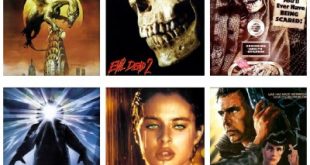
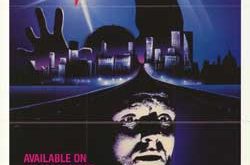
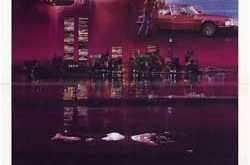


That was a really great interview. Larry Cohen has a sizeable EGO but it’s hard to deny he’s earned the right to it. This was a fun, insightful read; my only complaint is I wish it had run longer.